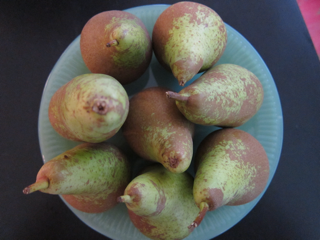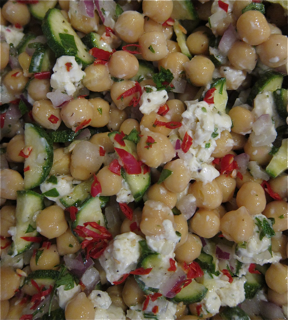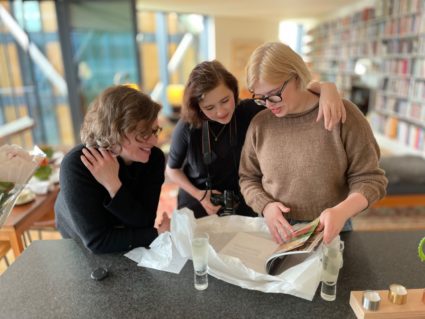The Great Recipe Debate

Have you ever looked into your refrigerator, seen a big bunch of leeks and a container of cream and thought you ought to do something with them? So you moseyed on over to your computer, typed in the search box “leeks and cream recipes” and found a whole host of suggestions. From a whole host of sources, in fact, which in turn represent a whole host of cooks, who’ve contributed their recipes to these vast compendia, online. And did you find a recipe that you wanted to try?
Have you, on the other hand, ever sat down in a comfortable chair with a cookbook, or even a memoir by a cookery writer, and read beyond all the time you really had to spare, dog-earing pages that contained recipes you were tempted to try?
Well, I’ve done both. Many times, both. So I’m intrigued by the debate currently popping up around Facebook and other places I dart around on the internet: is there any justification for online recipe databases, or should we all be rooted firmly in the cookbook tradition? One chef I like a lot, Clifford A. Wright, has come down firmly on the side of cookbooks, calling internet recipe trawling nothing more than “cooking by numbers,” insisting that if you want to become a better cook, you need to read real books, written by real people and, importantly published by real publishers.
What’s the point, he asks, of looking up “lemon cake” for example on an internet search, and coming up with a recipe by (I’m paraphrasing here) Betty, handed to her by her friend Louisa? Who is Betty, anyway, much less who is Louise, and why should we care about their recipes for lemon cake? Have these ladies any bona fides, after all?
Wright insists that the battle toward good cooking is to be won by reading and learning from advice from tried and true sources, taken in context. Marcella Hazan, for example, doyenne of Italian cookery, just look at the cookbooks she has to her name, the published history, the famed reputation. Anything Marcella tells us has weight, believability, and CONTEXT. We know something about the recipe just because Marcella has given it to us.
Betty and Louise? Somewhere in Wisconsin? Not so much.
I think there is room for both, as far as inspiration, direction and just plain recipes go. Let me explain.
Clearly I have no trouble collecting cookbooks. When I first started cooking, and buying cookbooks, a quarter of a century ago, I looked for titles like “The Essentials of Classic Italian Cooking,” or “Mrs Chiang’s Szechwan Cooking” (actually both of these were gifts from my adored mother in law!) or “The Breakfast Book,” by Marion Cunningham, a book that I read avidly, dog-earing nearly every other page. In short, I was an ignorant beginner, and I needed as many classic sets of instructions as possible. Olive oil for Italian cooking, peanut oil for Szechwan, rosemary for Italian, soy sauce for Szechwan, garlic for both, pasta beyond spaghetti and macaroni, Chinese food that involved chopping and stir-frying, rather than picking up the phone. And breakfast! Everybody needs a basic muffin recipe, and a way to make hollandaise in a blender, not a double boiler. Basics. Inspirational basics.
The longer I cooked, the more confident I felt in my own opinions. And the more I got interested in the life stories of the cookery writers I liked. As necessary as I found the recipe for Laurie Colwin’s beef stew, as a newlywed, even more sustaining was her commentary on “Alone in the Kitchen With An Eggplant,” her musings about how much she hated Thanksgiving stuffing and why, until she thought of one with Italian sausage and heavy cream… her memories of the worst hangover of her life and how much it was helped by toast and lemonade.
In short, I love cookbooks. I read them like fiction. I find hundreds of recipes I want to cook, I mark all the pages, I daydream and am inspired, and then… I read another. They enrich my life, their spines smile gently at me from my bookshelves when I have an idle moment, memories come back. That story about a whole beef filet, on New Year’s Day, with the tarragon mustard sauce… must make that again, and what about Orlando’s straw potatoes cooked in hot goose fat? How I love Orlando, how his writing workshop changed my life… Avery loves those potatoes.
That is an irreplaceable part of my life, that shelf full of cookbooks.
Now then. What about those leeks and cream in your fridge? What to do with them? Or the big plate of pears your neighbor Charlotte brought over, picked from her own back garden tree?
There is nothing easier than to run to the computer, type in “leeks and cream recipes” and decide to try a tart, adding some diced ham and a bit of fresh thyme you happen to have sitting in a glass on your counter. Or how about a hot soup, or cold vichyssoise? All wonderful ideas. Pear tart, pear and applesauce, pear salad with gorgonzola and rocket? Great ideas, to be found by typing in “pear recipes.” But possibly not one cookbook on your shelf would have recipes for them. You wanted laser-guided research for this one.
Or a leftover brisket stares you in the face. Couldn’t you make corned-beef hash of that, you think. What else is IN corned-beef hash, anyway, you wonder? Run to google, find several hundred recipes, all of which assure you: onions and potatoes and a lifetime supply of butter. Done.
Of course, you don’t get any sense of the life history of the author of Recipe Number 101 for leek tart. You don’t know if the corned-beef hash lady with the nicest photograph of her dish is English, or American or French. You just like her photo and the basics of her instructions. So be it. As Audrey Hepburn said in “Charade,” “I don’t have room in my life for another friend. In order for me to make a new friend, a friend I have now would have to die.” Sometimes you just want a recipe.
I proposed this debate — to find recipes online or not, that is the question- to my long-suffering husband and recipe guinea pig, John. And he immediately confirmed what I thought. (So convenient, that trait, in a husband). Both online and on-bookshelf are completely necessary. What you lose in the online search, he says, is simple. “There’s no accidental discovery.” Looking for corned-beef hash, you won’t accidentally come upon cassoulet, and be transported back to Paris in all its garlicky, bean-laden glory. You’ll find corned-beef hash.
It’s the old debate between the merits of Amazon.com, and the merits of Daunt Books in the Marylebone High Street. You go to Amazon.com when you want the latest in the Donna Leon mystery series set in Venice. There it is, you buy it. Corned-beef hash all over again. But if you don’t know WHAT you want, you just know you haven’t anything to read, you go to Daunt, and browse. You turn from Agatha Christie to Stephen Fry to street guides of Morocco to the Man Booker Prize shortlist. You are inspired.
You could make cassoulet after all.
So I am pleased that I don’t have to choose between allrecipes.com and “The Clatter of Forks and Spoons” by Richard Corrigan, that sexiest of all portly Irish chefs. I can look up the proportion of flour to yeast online when I want to make pizza, and accomplish that in 30 seconds, no distractions. And when I want to read about Dublin bay prawns and be lured into a recipe for a creamy crab tart with goats cheese, I can cozy up with Richard and be transported.
Isn’t it nice to have both.
And for a complete diversion, don’t forget that most spontaneous way to find a recipe. It’s on that plate of salad you had for lunch, at your local deli, and in your tastebuds and taste memories and the inspiration of your life’s cooking. Taste, be inspired, and cook.
Chickpea and Courgette Salad with Mint, Chillies and Goats Cheese
(serves 4 as a side dish)
2 soup-size tins chickpeas, drained
1 large courgette (zucchini), inner seedy core discarded, and the courgette diced
3 cloves garlic, minced
8 leaves mint, minced fine
handful flat-leaf parsley, minced fine
1/2 red onion, diced
juice of 1 lemon
LOTS of olive oil, perhaps 1/3 cup
sea salt to taste, fresh ground black pepper
sprinkling of minced hot red chillies
100 grams goats cheese, crumbled
In a big, shallow bowl, mix everything but the goats cheese very well, stirring as you add ingredients, letting stand a bit. Just before serving, sprinkle on goats cheese and mix gently.




i really must see charade… ive been saying that line all my life :)
There is so much truth in the word “Context”. You discover something, and value it, in what context? As books move inexorably online (I still hold the dear paper in my hands), so will cookbooks. There will be new cookbooks, in formats familiar and welcoming to our grandchildren; recipes created, gathered, and refined by the Marcella Hazan’s and Ottolenghi’s of the future. But I hope there will always be a few deviants who collect the antique, and treasure their shelves of battered guides…
I too am in a fight to keep books part of our life… I am succumbing to listening to audio “books” as mp3 files! But nothing will ever replace my battered and adored books, I assure you.
If I live to be a hundred I won’t have enough time to read all the cookbooks I have and I bought another last week. What WAS I thinking? I think I“m afraid to let a single recipe get away. Sigh.
Sigh, yes. And yet I cook the same things over and over again! But I cherish my books, as you know, having given me a large proportion of them over these 28 years!